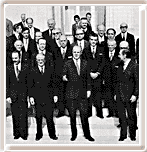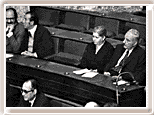 |
The government of National Unity consolidated its position,
legalized the action of political parties, including the communist parties, and proceeded rapidly to elections,
in which the New Democracy Party, founded by K. Karamanlis, secured an overwhelming majority (54%). The Centre
Union constituted the main opposition party, while in the elections held in November 1974 the newly founded
Panhellenic Socialist Movement (PASOK) under the leadership of Andreas Papandreou emerged in the political arena.
The referendum held in December 1974 resulted in a vote against monarchy, evincing the vast popular support to the
constitution of Presidential Parliamentary Democracy. A few months later the new Constitution was being voted.
Parliamentary democracy functioned excellently during the following years, a phenomenon to which Greece was
unaccustomed. After the ‘cleansing’ of junta elements (trial of the prime movers, the main torturers etc.). K. Karamanlis
proceeded to two impressive political moves. Having withdrawn the country from the military branch of NATO (1974)
after the invasion in Cyprus, the equal membership in the EEC would be the spine of his foreign policy. At the
same time, on the economy front, he expanded the economic functions of the public sector (‘nationalizations’ of
transports, refineries etc.) and introduced a period of economic stringency.
The Turkish occupation of the northern part of Cyprus poisoned the relations between Greece and Turkey after 1974,
while the constant contestation of the Greek territory (territorial waters and airspace) triggered off repeated crises.
The climax of tensions was the provocative Turkish actions in the summer of 1976 (sortie of the Turkish ship Chora in
the Greek territory). Turkey continues until today to dispute the international treaties that specify the delimitation
of the continental shelf in the Aegean.
 |


 |


